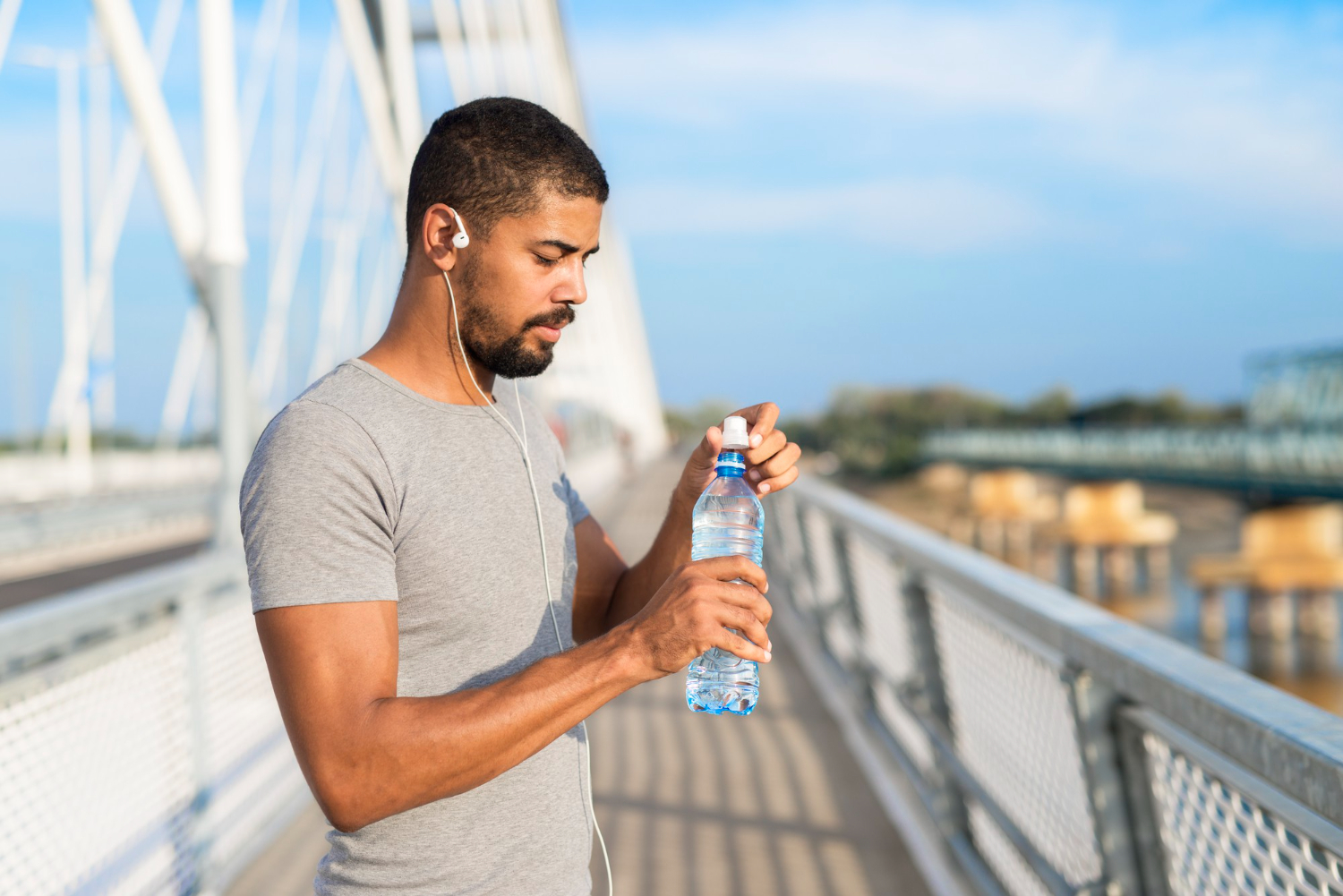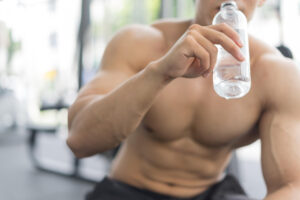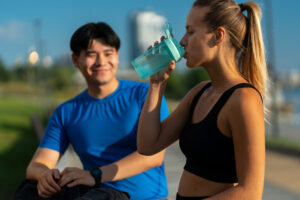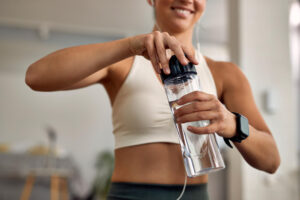Hydration might seem simple, but it’s a game changer in fitness. Every athlete knows the pain of muscle cramps or the exhaustion that sweeps through your body when you’re not drinking enough water.
But did you know staying hydrated can actually enhance your physical performance? It’s true – keeping the body well-watered boosts everything from strength to stamina, making proper hydration a cornerstone of effective exercise.
I’m Serg Bayracny, with over a decade of experience coaching and helping people reach their peak physical condition. My journey began in a local gym and led me to a Master’s degree in Physical Education and becoming a certified personal trainer.
I’ve learned along the way that while lifting weights and cardio are crucial, mastering fluid intake is just as important for achieving athletic excellence. Ready to see how water can elevate your workout?
Key Takeaways
- Drinking enough water throughout the day helps keep joints moving smoothly, improves workout performance, and speeds up recovery after exercise.
- Eating foods high in water like fruits and vegetables adds extra hydration, which supports overall health and fitness.
- Watching the color of your pee can show if you’re well-hydrated; light yellow is good but dark means you need more water.
- Sports drinks with electrolytes are helpful during long or intense workouts to prevent cramps and improve energy levels, but it’s important to avoid too much sugar.
- Carrying a water bottle encourages regular drinking before, during, and after workouts to ensure optimal hydration.
The Crucial Role of Hydration in Physical Performance
Drinking enough water is key to doing well in sports and exercise. It helps your body work its best during a workout. For more tips on staying fit and healthy, check out Workout Guru’s website for fitness advice and exercise routines https://workoutguru.fit/workouts/workout-tips/
Enhancing Athletic Output
Staying hydrated boosts athletic performance. Water helps keep the body cool and increases blood flow to muscles. This lets you work out harder and longer. Sports drinks can be smart choices, too.
They replace lost electrolytes and keep energy levels high during intense training or long runs.
Proper hydration can take your workout from good to great.
Eating foods high in water content also supports muscle function. Think of fruits like oranges or watermelons. They help you rehydrate and give your body important nutrients for exercise recovery.
So, keeping a water bottle handy during physical activity is key to enhancing your output and reaching fitness goals.
Preventing Injuries
Drinking enough water keeps your joints lubricated. This helps you move smoothly during workouts and lowers the risk of getting hurt. Well-lubricated joints mean less chance of injury while exercising.
Keeping hydrated also makes your muscles work better. When muscles get the right amount of fluids, they are less likely to cramp or suffer strain. This is vital for avoiding muscle soreness and fatigue that can lead to more serious injuries.
Hydration plays a big role in preventing heat-related illnesses too, like heat stroke or heat exhaustion. These conditions can happen if your body gets too hot during physical exertion and doesn’t have enough fluids to cool down.
By drinking water regularly, you help keep your body’s temperature in check and avoid overheating. This way, you reduce the risk of collapsing or feeling weak because of high temperatures while active.
Supporting Muscle Functions
Staying well-hydrated helps your muscles work well. Your body needs water to move nutrients and get rid of waste. This keeps your muscles strong and prevents muscle fatigue. I’ve noticed in my training that when I drink enough water, my strength and endurance are better during workouts.
Good hydration keeps the electrolyte balance right in your body. Electrolytes help with muscle contractions and keep you from getting cramps or feeling weak. After long runs or heavy lifting sessions, I make sure to have a recovery drink that has electrolytes like sodium and potassium.
This speeds up my recovery by replacing what I lost in sweat.
Preventing Cramps
Drinking enough water is key to stop muscle cramps. Muscles need water and electrolytes to work right. If you don’t drink enough, your muscles might get tight and hurt. This happens a lot during exercise or in hot weather.
Make sure you drink before, during, and after working out.
Eating foods rich in minerals like potassium and magnesium also helps prevent cramps. Bananas, avocados, and nuts are good choices. These foods help keep the balance of electrolytes in your body.
When this balance is off, you’re more likely to get cramps. So, keeping hydrated and eating well can keep those painful muscle cramps away.
Ensuring Proper Respiration
Staying hydrated helps your lungs work well. You need good lung function to breathe right during exercise. Proper hydration keeps the oxygen moving through your body. This makes it easier for you to keep going, even in tough workouts.
Water plays a big part in how our bodies control temperature and blood volume. If we don’t drink enough, our heart works harder. Our blood gets thicker, making it tougher for oxygen to reach muscles and organs.
This means we can feel tired faster and may not do as well in sports or gym activities.
Effective Hydration Strategies for Athletes
Athletes need to stay hydrated to keep their performance top-notch. They follow smart drinking plans and use bottles for water, making sure they drink enough before, during, and after workouts.
Drinking Patterns: Before, During, and After Workouts
Staying hydrated is key to smashing your fitness goals. Good drinking habits can help keep your performance top-notch and speed up recovery. Here’s how to nail your hydration:
- Start sipping water about 2 hours before exercising. This heads off dehydration before you even begin sweating.
- Aim for small, frequent sips during your workout to replace lost fluids without feeling bloated.
- After finishing your exercise, focus on rehydrating to make up for any sweat loss. Drinking chocolate milk or isotonic drinks can be great here because they help restore fluid balance while giving you carbs and protein for recovery.
- Keep an eye on urine color as a hydration check; light-colored pee means you’re doing well, while dark means you need more H2O.
- Avoid waiting until you feel thirsty to drink; by then, dehydration has already started setting in.
- For long sessions or high-intensity training, include a beverage with electrolytes to prevent imbalance of electrolytes, which can lead to cramps and decreased performance.
- Calculate your sweat loss by weighing yourself before and after workouts (nude). Replace each pound lost with about 16-24 ounces of water or sports drinks.
- Don’t overlook pre-workout hydration; starting off well-hydrated supports stamina and keeps muscles strong.
- Use apps or water bottles with reminders to keep drinking regularly throughout the day, not just around exercise times.
- Adjust your intake on rest days but maintain consistent daily water intake – staying hydrated is a full-time job!
In my years coaching athletes at all levels, I’ve seen firsthand the difference staying hydrated makes in their performance and recovery times. Taking these steps seriously can transform an average workout into an excellent one while keeping your body healthy and ready for more action tomorrow.
Always Carry a Hydration Bottle
Knowing how much to drink before, during, and after your workout sets the stage. Next up, having a water container with you makes all the difference. It’s like your personal hydration station, ready whenever you are.
I’ve seen it firsthand in my training routine and with my clients. A durable water jug is a game-changer for staying hydrated without interruption.
Have it by your side whether at the gym or outdoors keeps dehydration symptoms—like dry mouth or headache—at bay. Plus, keeping track of how much you’re drinking becomes easier.
You won’t have to pause your exercise session to search for a water fountain or buy a drink. This simple step supports muscle strength, flexibility, and recovery right when your body needs it most.
Checking Urine Color for Hydration Levels
Keeping an eye on your pee color is a smart way to check if you’re drinking enough water. Light yellow means you’re doing great, but dark yellow tells you to drink more. It’s like having a hydration meter that’s easy to use.
As a fitness coach for over ten years, I’ve seen how dehydration can slow athletes down and hurt their performance. I always tell them, “Your body’s alarm for water is not just thirst—it’s also the color of your urine.” This simple test helps my athletes stay on top of their game without guessing if they need more fluids.
Stay ahead in the race with hydration – your pee color will guide the way!
Using Sports Drinks Wisely
Sports drinks can be a big help during workout. They keep you from getting dehydrated, and they give back salts your body loses through sweat. But it’s good to know the right time for drinking them.
Use these drinks when you’ve been moving a lot and sweating for more than an hour. This is something I learned from years in the gym and on the field.
It’s easy to drink too many sports drinks, thinking they’re always good for you. Keep in mind, these drinks have sugar that can add up quick if you’re not careful. Pick zero-sugar versions if you can find them to stay away from extra calories.
Listening to your body is key here—drink water if your workout is lighter or shorter.
Avoiding Dehydration Culprits: Alcohol, Sugary Drinks, and Caffeine
Drinking alcohol, sodas, and caffeinated beverages can hurt your hydration. These drinks may seem refreshing but they pull water from your body. As a fitness coach, I’ve seen many athletes struggle with dehydration after consuming these before or after workouts.
It’s better to choose water or hydrating sports drinks that help keep your energy up and avoid the bad effects of dehydration like weakness or delayed onset muscle soreness.
Eating hydrating foods is another smart move. Foods like fruits and vegetables add water to your diet and help you stay hydrated. This way, you can keep your workout performance high without feeling sick from not having enough water in your system.
Eating Hydrating Foods
Moving away from drinks that can dehydrate, like hard liquor and sweet beverages, eating foods full of water is a smart move for hydration. Foods such as cucumbers, oranges, and watermelons are not just refreshing; they pack a big punch in the water department.
They help keep your body hydrated. This makes them perfect for post-workout rehydration or to munch on throughout the day.
Incorporating these juicy fruits and veggies into meals adds to your daily fluid intake without feeling like a chore. Think about adding berries to your morning oatmeal or having slices of cucumber with hummus as a snack.
These choices are good for your hydration levels and also rich in vitamins and minerals which support overall health and fitness. Eating hydrating foods works alongside drinking enough water to prevent dehydration symptoms such as nausea, maintaining energy levels, and aiding in muscle recovery after exercise.
The Impact of Fluids on Fitness Outcomes
Drinking enough water makes your joints work better and helps you do exercises more easily. It also speeds up how fast you get better after working out.
Lubricating Joints
Fluids play a big role in keeping our joints happy and moving smoothly. Think of them as oil in a machine. Our bodies need water to make sure our bones don’t rub the wrong way against each other.
This can cause pain or even damage. For someone like me, Serg, who spends every day either coaching fitness routines or trying out new strength sports, understanding this was a game-changer.
It helped me guide my students better on how to hydrate not just for muscle recovery but for joint health too.
In fitness, every drop counts; hydration fuels more than just muscle—it’s the secret agent behind healthy joint movement.
With proper fluid intake, folks can prevent injuries that come from stiff or unhealthy joints—like during marathon running where there’s lots of wear and tear. Fluids help maintain body temperature too, which is essential when we’re pushing our limits and heating up fast.
Hydration isn’t only about quenching thirst; it’s also about keeping those important parts lubricated. From personal experience, I’ve seen athletes improve their distance running times and overall physical performance by paying attention to something as simple as drinking enough fluids throughout their training days.
Boosting Workout Performance
Drinking enough water improves your gym time. It helps your body use energy better. This means you can run longer, lift more, and not get tired too fast. Water keeps your body cool, so you don’t overheat.
Eating foods with lots of water and drinking sports drinks add important stuff like electrolytes. These are salts that help your heart beat right and muscles work without cramps. So, keeping hydrated means better workouts and faster muscle recovery after exercising.
Facilitating Post-Exercise Recovery
After boosting your workout performance, your body needs to recover. This is where fluids play a huge role. Drinking water and energy drinks right after exercising help replace what you lost through sweat.
They also speed up recovery by getting rid of waste in your muscles.
I’ve seen marathon runners bounce back faster when they focus on post-workout hydration. They drink fluids that have electrolytes to balance their body chemistry. Foods rich in water content also help with muscle repair and bring down the chances of dehydration symptoms like dizziness or headaches.
From my experience, keeping hydrated helps maintain blood sugar levels steady and supports joint lubrication which is key for moving easily after tough workouts.
Practical Tips for Optimal Hydration
Keep water close all day to stay hydrated. Check how clear your pee is to see if you’re drinking enough. Choose drinks with minerals after sweating a lot. Eat fruits and veggies that are full of water.
This keeps you ready for any sport or workout! Drink up and feel the difference in your fitness journey!
Meeting Daily Water Intake Recommendations
Drinking enough water every day is key for your health and fitness. The human body needs plenty of fluids to work well. This helps in oxygen circulation, keeping the body temperature right, and avoiding dehydration.
Experts say you should drink about eight 8-ounce glasses of water a day. That’s like filling up a large soda bottle. But, if you exercise or it’s hot out, you might need more.
From my time as a personal trainer, I’ve seen many athletes forget to sip water throughout their busy days. A simple trick? Use a water bottle that shows how much you’ve drunk — this keeps track easier.
Also, looking at your pee can help! If it’s light and pale like lemonade, good job; if not, grab some more water.
Your hydration levels can change the game—drink up.
Next comes replacing fluids based on sweat loss during exercise.
Replacing Fluids Based on Sweat Loss
Sweating during a workout means losing water and salts. Your body needs these back to feel good and keep moving well. Weigh yourself before and after exercise. The weight you lose is mostly water.
For every pound dropped, drink about 16 ounces of water or a sports drink with electrolytes to balance things out again. This trick helps prevent dehydration symptoms like weak muscles and a fast heartbeat.
Keeping track of fluids can be easy with this method, making sure your hydration matches your effort. Next up, let’s talk about how staying hydrated all day long is just as crucial for your health.
Keeping Hydrated Throughout the Day
Drink water often to stay on top of your game. As a fitness coach, I always have a hydration bottle with me. This simple tool reminds me to sip water all day, not just at the gym. Drinking enough keeps our body temperature in check and helps avoid dehydration symptoms like tiredness and confusion.
It’s key for keeping muscles happy and joints moving smoothly.
Eating foods full of water is another smart move. Think of fruits like oranges or vegetables such as cucumbers. They can give you an extra hydration boost without feeling heavy on the stomach.
Keeping track of how much you drink can be easy—just glance at your urine color. Aim for light yellow to know you’re on the right track. And don’t forget, when you work out hard and sweat a lot, replacing fluids is critical to prevent weight loss due to sweat and keep breathing easy during exercise.
FAQs
1. Why is drinking water so important when I work out?
When you exercise, your body gets hot… and to cool down, it sweats. This means you lose water. If you don’t drink enough, you might get dehydrated. That can make your heart rate go up and even lead to things like feeling dizzy or getting a headache.
2. Can not drinking enough water affect how well I do in sports or exercise?
Yes! Your muscles need water to work well. Without enough water, they won’t have the energy they need… which is stored as something called glycogen. So, if you’re dehydrated, your muscles could get tired faster than usual.
3. What signs should tell me I’m not drinking enough during workouts?
Feeling really thirsty isn’t the only sign of dehydration… There are others like not peeing much or having dark yellow pee; feeling tired all of a sudden; getting muscle cramps; or just not being able to think clearly.





